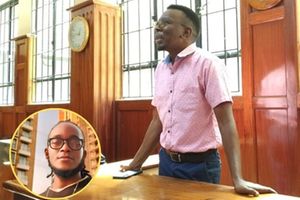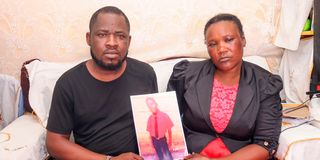
Michael Ouma and Josinter Anyango, parents of 12-year-old Kennedy Onyango, who was killed during anti-government protests in Rongai, during an interview at their home in Ongata Rongai on May 20, 2025.
In the corner of the living room cupboard, Kennedy Onyango’s sketchbook gathers dust and remains untouched for almost a year.
It still holds the last thing he ever drew: a mosque, carefully outlined with the quiet devotion of a 12-year-old who loved to sketch more than anything.
That day, he packed up his tools - pen, brushes, a small tin of paint - and walked past his mother’s door with a soft goodbye smile. She did not know it then. That fleeting moment would be the last time her mother Josinter Anyango saw her son alive.
Kennedy was shot and killed by police during demonstrations in Rongai, Kajiado County.
It has been nearly a year since her mother’s world fell apart with the ring of a phone call - just one call that shattered everything.
Kennedy had stepped out to buy a book from the shops.
The protests had turned chaotic, but Kennedy didn’t know that when he smiled at his mother and slipped out the door. He never came back.
Videos taken on the spot from that day show Kennedy bleeding, broken and fighting for his last breath.

A picture of 12-year-old Kennedy Onyango who was killed during anti-government protests in Rongai.
Life was ebbing out of his body.
He gasped, eyes wide with fear, his chest rising and falling in painful spasms. Then, slowly, the fight began to slip away.
A Good Samaritan rushed to help, desperate to save him, carrying Kennedy toward the hospital. But before they could get there, he was gone. Pronounced dead on arrival.
By the time his mother, Josinter, reached the hospital, hope had already drained from the room.
“He was lying on a stretcher... cold,” she says, her voice trembling.
Then she pauses, lifting the edge of her lesso to wipe away tears that won’t stop coming.
“My loving son was no more.”
The death of Kennedy was heartbreak in slow motion.
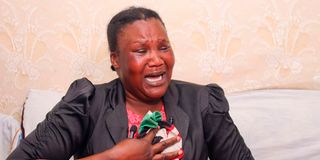
Josinter Anyango, mother of 12-year-old Kennedy Onyango, who was killed during anti-government protests in Rongai, is overcome with emotions during an interview at their home in Ongata Rongai on May 20, 2025.
The middle child who sketched quiet worlds into existence with pencil and paint.
The boy who rarely quarrelled, who chose books over banter, silence over strife.
The kind of teenager who, even in the age of noise and rebellion, kept to his corner, dreaming in colours.
Kennedy the gentle. Kennedy the peacemaker, his mother said.
He never made a fuss. He never stormed out. Never sulked.
He’d rather fetch water, sweep the floor, or disappear into his sketchbook than raise his voice. If the house needed help, he was there.
If his siblings needed company, he was present. Not loud. Just there.
His mother, still hears his soft, hopeful and reassuring voice.
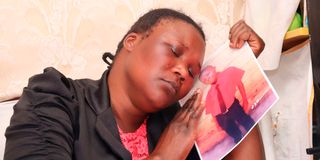
Josinter Anyango, holds a portrait of her 12-year-old son Kennedy Onyango, who was killed during anti-government protests in Rongai, during an interview at their home in Ongata Rongai on May 20, 2025.
That last conversation plays on loop in her mind like a memory that won’t be stilled.
Her rent was overdue, and worry had crept into her voice.
Kennedy, ever the quiet fixer, had a plan.
He was drawing a mosque, he told her, and knew someone who might buy it.
Just enough to settle the arrears. Just enough to breathe a little easier.
But they did not know that it would be the final thread in their tapestry of small talks. That those gentle promises would hang in the air with nowhere to land. That there would be no second conversation.
It was one of those everyday exchanges between a mother and a son: soft-spoken, full of intent, and tender with unspoken dreams. It was nothing remarkable. Until it was the last.
The healthiest of all her children had been plucked. All his other siblings are suffering from sickle cell.
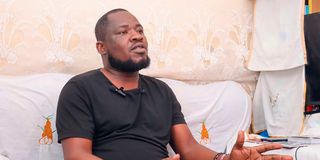
Michael Ouma, father of 12-year-old Kennedy Onyango, who was killed during anti-government protests in Rongai during, an interview at their home in Ongata Rongai on May 20, 2025.
After Kennedy’s death, in a televised interview last year after the protests that claimed Kennedy’s life, President William Ruto first said he was not aware Kennedy had died.
But after the interview, he promised to reach out.
And when he reached out, “he (President Ruto) said he will look into the matter and even invite the family to State House,” Kennedy’s mother said.
He reached out through his handlers, Mr Dennis Itumbi, but “I spoke to the President directly,” she narrated.
Except that she did not record the phone call, she saved the number of the caller.
But after that conversation, soon after everything went cold… and continues to grow colder.
Nation sent text and WhatsApp messages to Mr Itumbi through his known phone number, but had not gotten a response by the time of going to press.
We also sent questions to State House Spokesperson Hussein Mohammed, who had not responded as well by the same time as well.
Today, Josinter wants one thing: for someone to be held accountable.
If justice would take any form, Mama Kennedy only wishes that at least the police who killed his innocent son be arrested.
She would get solace from that.
But she also hopes that all that the government promised will be honoured.
“I just want the police officer who shot my son to be named. I want the officer to face the law,” she said.
For now, she only clings to the President’s words. The promises. The call. And the faint hope that maybe, one day, the silence will break.
And maybe, just maybe, Kennedy’s sketch of a mosque - once meant to feed his family - will instead become a symbol of justice too long delayed.
“I wake up and still think he might walk in,” she says. “But now, I just wait. For justice. For someone to remember my boy.”

